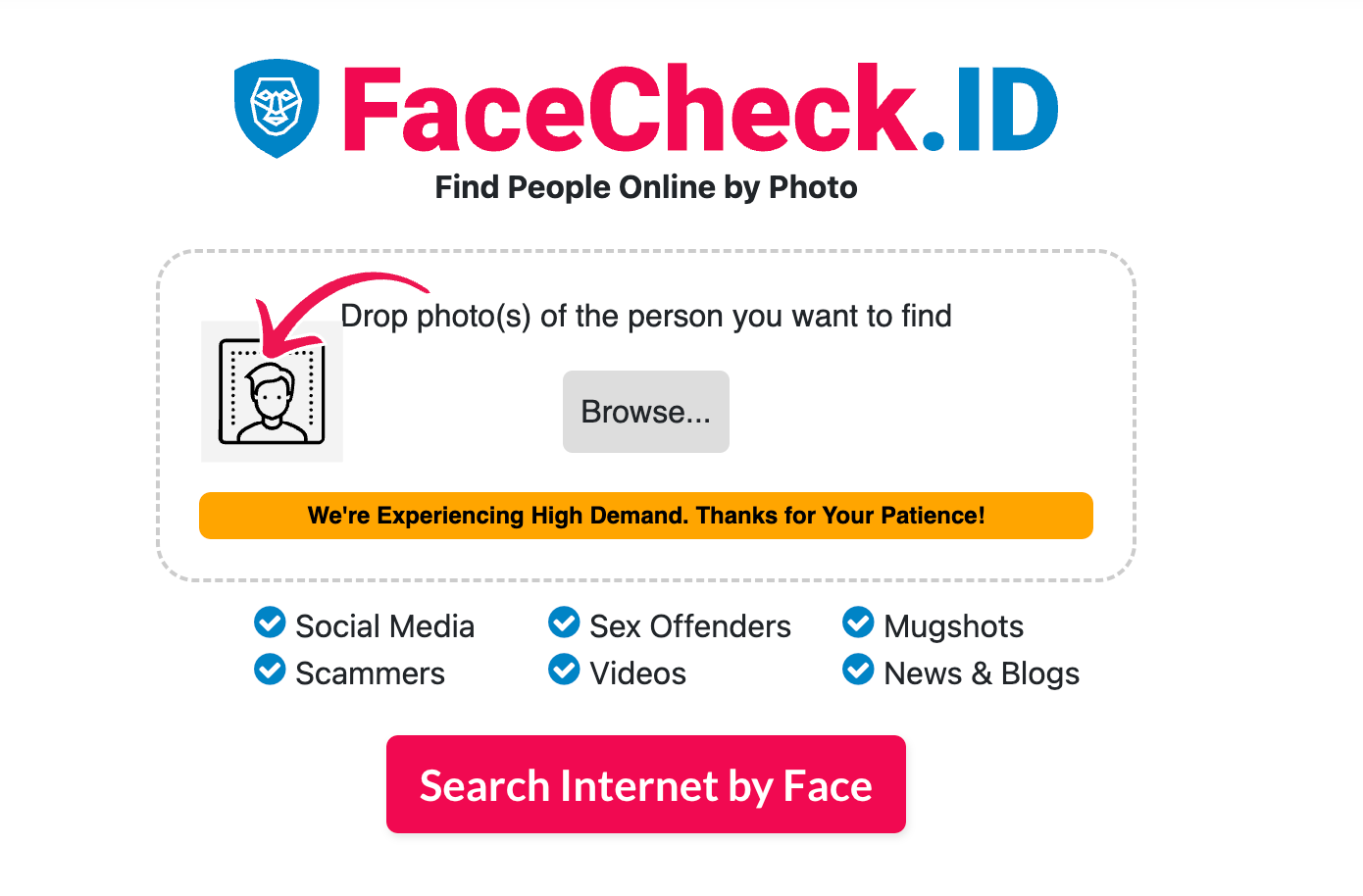FaceCheck.ID has garnered significant attention for its robust reverse image search capabilities. This tool allows users to trace the origin of images, find similar ones, or discover altered versions of the same picture. While FaceCheck.ID is incredibly useful, there are other websites offering similar functionality. here are the following you read and know about the reverse search engine, top-rated reverse search engines, similar sites and alternatives to working, and an updated list of Facecheck.id face search websites.
What Does Mean By Reverse Image Search?

In the vast expanse of the digital world, textual data is no longer the sole component that users rely upon. Images, too, have taken center stage, driving the need for tools that can explore the internet visually. Enter reverse image search, a powerful tool that flips the traditional search model on its head.
Definition of Reverse Image Search
Reverse image search is a specialized search engine capability that allows users to query the internet using an image instead of text. By uploading an image or providing its URL, users can find the origins of the image, track down potential copyright infringements, discover visually similar images, or even get more information about the objects and landmarks present in the picture.
How Reverse Image Search Works?
At its core, reverse image search operates by analyzing the submitted image, breaking it down into a digital fingerprint or a unique pattern. This pattern is then cross-referenced with billions of images on the internet, seeking matches or visually similar results. Advanced algorithms, often supported by machine learning, ensure that the results are relevant and accurate.
Applications and Uses Of Reverse Image Search

The potential uses of reverse image search are incredibly diverse, spanning both personal and professional realms:
- Origin Tracing
In the age of digital art and photography, it becomes vital to trace back an image to its original source or creator. Whether it’s an artist trying to ensure their work hasn’t been appropriated without credit or a user hoping to find the primary origin of a meme, reverse image search aids in navigating the vast digital ocean to pinpoint the image’s genesis. This has implications for crediting, licensing, and even ensuring accurate attribution in academic or professional presentations.
- Copyright Verification
Digital piracy and unauthorized reproductions have become rampant. Artists, photographers, and content creators often face the challenge of their work being distributed without permission. Reverse image search acts as a watchdog in these scenarios. By quickly scanning the internet for matches, it’s possible to detect where an image has been used, allowing for potential legal recourse or simply requesting due credit.
- Fact-Checking
In an era dominated by ‘fake news’ and misinformation, the authenticity of images circulating on social media or news platforms is frequently under scrutiny. Did that political figure really attend that controversial event? Was that animal really spotted in a location where it’s considered extinct? Reverse image search aids journalists, researchers, and the general public in verifying the context and authenticity of images, ensuring that stories and claims are backed by legitimate visual evidence.
- Shopping
Ever seen an item of clothing or a piece of furniture that you loved but had no idea where to buy it? With reverse image search, consumers can simply upload a picture of the desired item, and the search engine will scout online retailers and platforms to find a match or something visually similar. It bridges the gap between seeing and acquiring, making the shopping experience more seamless and intuitive.
- Research
Scholars, students, and curious minds often come across images old photographs, artworks, or documents with little to no accompanying information. When traditional text-based searches fail, reverse image search emerges as a powerful ally. It can help in identifying the context, origin, or even the historical significance of a picture, aiding in academic research, genealogy studies, or simple curiosity-driven explorations.
Evolution of Reverse Image Search
While early incarnations of reverse image search were rudimentary, advancements in AI and machine learning have greatly enhanced its accuracy and capabilities. Today’s tools can recognize faces, landmarks, objects, and even abstract concepts within images, making the technology indispensable in an increasingly visual digital landscape.
Top-Rated 15 Reverse and Face Image Search Tools in 2023
1. Facecheck.ID
Recognized as one of the forefront platforms for reverse image search, Facecheck.ID is designed to simplify the process of identifying sources, duplicates, and similar images across the internet. Primarily focusing on accuracy and speed, it’s built on advanced algorithms that can quickly scan vast repositories of data to fetch relevant results. Its user-friendly interface combined with its efficiency makes it a go-to choice for professionals and casual users alike.
Features
- Easy upload feature for images or direct input of URLs.
- Comprehensive database access to fetch varied results.
- Advanced filters to refine searches by date, relevance, and other parameters.
- Fast and accurate results powered by optimized algorithms.
- Mobile-friendly design for on-the-go searches.
- SafeSearch filter to keep results free from explicit content.
- Offers visually similar image recommendations based on the initial query.
Why Facecheck.ID Unique?
- Precision-Focused Algorithm: Prioritizes accuracy in its search results, ensuring users find what they’re looking for.
- Expansive Database Access: Scans an extensive array of online sources to deliver comprehensive results.
- User-Centric Design: The platform is designed with user experience in mind, ensuring ease of use without compromising on features.
- Swift Processing: Known for delivering results quickly, even with large image files.
- Adaptive Format: Regardless of the device being used, Facecheck.ID adjusts to provide an optimal search experience.
14 Alternatives To Facecheck.ID Sites that working

2. Google Images
As the image search extension of the world’s most popular search engine, Google Images goes beyond just finding pictures based on text queries. It allows users to input an image, either by URL or direct upload, to find related images across the vast expanse of the internet. With Google’s vast database and advanced algorithms, users can expect a wide array of results, from exact matches to visually similar suggestions. This versatility and comprehensive approach make it a primary choice for many when it comes to image reverse searches.
Features
- Option to upload images or paste URLs for reverse search.
- Integration with Google Lens for real-time object and landmark recognition.
- Advanced search filters allow customization by size, color, type, and more.
- Time-based search to find recent images or images from a specific timeframe.
- Directly taps into Google’s vast data repositories, including its Knowledge Graph.
- SafeSearch filter to exclude explicit content from the results.
- Provides recommendations for visually similar images.
Why Google Images Unique?
- Machine Learning Excellence: Utilizes powerful machine learning algorithms to refine and tailor search results.
- Google Lens Integration: Real-time object, text, and landmark recognition enhances the search experience.
- Unparalleled Database Access: Google’s vast database ensures comprehensive and varied results.
- Customizable Advanced Filters: Users can narrow down results based on various criteria, ensuring precise findings.
- Seamless Integration with Google Ecosystem: Whether it’s Google Drive, Google Photos, or other Google services, the cross-platform integration ensures a cohesive user experience.
3. Image Raider
Image Raider stands out as a consolidated reverse image search tool. Instead of searching one platform, Image Raider simultaneously scans multiple search engines, ensuring comprehensive results. Its robust algorithm guarantees that users receive the most extensive range of matching or similar images, making it a favorite for those seeking an all-encompassing search solution.
Features
- Aggregates results from multiple search engines.
- Scheduled regular image searches for ongoing monitoring.
- Supports bulk image uploads.
- Direct source link provision for identified images.
- Cross-platform compatibility (works on both desktop and mobile).
- Integration with major image repositories and databases.
- User-friendly interface with intuitive navigation.
Why Image Raider Unique?
- Consolidated Searches: One query taps into multiple search engines.
- Recurrent Monitoring: Option to schedule regular image checks.
- Bulk Processing: Supports searching for multiple images simultaneously.
- Cross-Platform Design: Accessible and efficient on various devices.
- Major Integrations: Directly connected with renowned image platforms and databases.
4. RevIMG
RevIMG differentiates itself by offering reverse image searches based on visual similarity rather than exact matches. While it caters to finding exact duplicates, its strength lies in identifying images that share similarities, whether in color schemes, patterns, or themes. This capability makes it particularly useful for designers, artists, and content creators.
Features
- Visual similarity-based searching.
- Supports various image formats and sizes.
- Advanced filters for refining search results.
- Fast processing for swift results.
- Direct source linking for matched images.
- User-driven feedback mechanism for enhancing accuracy.
- Regular updates to improve search algorithms.
Why RevIMG Unique?
- Similarity Over Exactness: Prioritizes visually similar results.
- Designer’s Tool: Ideal for those in the creative fields.
- Adaptive Algorithms: Constantly updated for improved accuracy.
- User-Centric Feedback: Integrates user input for refined results.
- Diverse Format Support: Accepts a broad range of image formats.
5. IQDB
Tailored primarily for anime and manga enthusiasts, IQDB is a niche reverse image search engine. It excels at pinpointing the origins of anime stills, artwork, and manga illustrations. With its deep dive capabilities, IQDB provides users with exact matches, often linking directly to the episode, scene, or manga page.
Features
- Specialized anime and manga reverse search.
- A comprehensive database of anime scenes and manga illustrations.
- Direct links to source materials.
- Fast and efficient searching.
- Supports various image resolutions.
- Integration with popular anime and manga platforms.
- Active community-driven updates.
Why IQDB Unique?
- Anime & Manga Focus: Dedicated solely to these niches.
- Vast Database: Extensive collection of anime and manga visuals.
- Direct Source Linking: Connects users directly to the original content.
- Community Input: Benefits from updates and verifications by the user community.
- High-Resolution Support: Can process high-quality images without compromising accuracy.
6. ImgOps
ImgOps stands as a meta-tool that amalgamates various image operations, including reverse image search. This multifunctional utility offers not only search capabilities but also a range of image-related functions, from editing to analysis. Its all-in-one approach makes it a valuable asset for anyone looking to conduct multiple operations on an image without jumping between tools.
Features
- Comprehensive reverse image search function.
- Integrated image editing tools.
- Detailed image analysis and metadata extraction.
- Direct links to various image utilities and platforms.
- Support for GIF animations and video frames.
- Advanced search filters for more refined outcomes.
- Real-time image hosting recommendations.
Why ImgOps Unique?
- All-in-One Utility: Combines multiple image functions in one platform.
- Broad Search Capabilities: Taps into various databases for comprehensive results.
- Detailed Analysis: Offers in-depth insight into image properties and metadata.
- Integrated Editing: Users can modify and enhance images directly.
- Diverse Format Support: Extends capabilities to GIFs, animations, and video frames.
7. Trace.moe
A haven for anime enthusiasts, Trace.moe specializes in reverse image searches for anime content. Whether it’s a still from an episode, a meme, or fan art, Trace.moe will not only identify the anime source but also pinpoint the exact episode and timestamp. Its deep integration with the anime world makes it the go-to platform for fans seeking precise information.
Features
- Anime-centric reverse image search.
- Direct episode and timestamp identification.
- Integration with anime databases and streaming platforms.
- Active community-driven updates and verifications.
- Support for GIFs and video snippets.
- User feedback loop for result enhancement.
- Regularly updated library with current anime releases.
Why Trace.moe Unique?
- Anime Specialization: Solely focused on the expansive world of anime.
- Timestamp Precision: This goes beyond mere identification, providing exact episode details.
- Community Dynamics: Benefits from a passionate and active user community.
- Streaming Integration: Connects directly with popular anime streaming services.
- Ever-expanding Library: Continuously updated to include the latest anime releases.
8. Berify
Berify is synonymous with accuracy when it comes to reverse image search. Catering primarily to professionals, especially photographers and content creators, Berify excels at tracking images across the web, ensuring copyright protection. Its advanced algorithms work tirelessly to pinpoint exact matches, even for modified or edited images, giving peace of mind to its users.
Features
- Precision-focused reverse image search.
- Detection of edited or altered image versions.
- Copyright infringement alerts.
- Direct links to sources hosting the images.
- Support for large image batch uploads.
- Comprehensive search reports.
- Regularly updated database for real-time tracking.
Why Berify Unique?
- Professional Precision: Designed with the needs of professionals at its core.
- Adaptive Matching: Capable of identifying even altered versions of images.
- Bulk Search Capabilities: Allows for large batch uploads, simplifying the search process.
- Detailed Reports: Provides users with in-depth analysis of search results.
- Proactive Alerts: Keeps users informed about potential copyright breaches.
9. EagleEye
EagleEye stands out with its ability to deliver swift, accurate reverse and face image search results, backed by a user-friendly interface. Its name reflects its precision and speed, attributes appreciated by its user base. Beyond mere image matching, EagleEye dives into the nuances, ensuring that even the minutest details aren’t overlooked during the search.
Features
- Rapid reverse image and Face search capabilities.
- Fine-tuned algorithms for nuanced detection.
- Support for various image formats.
- User feedback mechanism for result refinement.
- Integration with popular social media platforms.
- Visual similarity suggestions.
- Safe search filters for content appropriateness.
Why EagleEye Unique?
- Speed and Precision: True to its name, EagleEye is both fast and precise.
- Nuanced Searches: Detects minute details often overlooked by other platforms.
- Direct Social Integration: Taps directly into popular social media for broader search results.
- Result Refinement: Leverages user feedback to continually improve search outcomes.
- Flexible Format Support: Can process a variety of image formats.
10. FindClone
Catering predominantly to the Russian audience, FindClone is a powerful reverse image search engine that holds its own against global competitors. Built with an intuitive interface and robust algorithms, it delves deep into web databases to fetch relevant matches. Its regional focus allows for unparalleled accuracy when scanning local platforms and sites.
Features
- Tailored for the Russian web landscape.
- Deep-dive algorithms for comprehensive searches.
- User-friendly interface and design.
- Integration with local platforms for better accuracy.
- Advanced filters for search customization.
- Secure and private search operations.
- Regular database updates for current results.
Why FindClone Unique?
- Regional Mastery: Best-in-class when it comes to the Russian digital landscape.
- Localized Integration: Seamlessly taps into local platforms and databases.
- User-Centric Design: Built with user convenience and experience in mind.
- Customizable Filters: Provides advanced options to refine search results.
- Privacy Commitment: Ensures user searches remain secure and confidential.
11. Bing Visual Search
As Microsoft’s answer to the search engine domain, Bing Visual Search is integrated with Bing’s primary search capabilities and leverages Microsoft’s vast technological assets. Its visual search stands out with seamless integration into the Microsoft ecosystem, enhanced by AI capabilities that provide a richer, more intuitive search experience. Whether it’s identifying objects, landmarks, or even shopping products, Bing Visual Search offers an encompassing solution.
Features
- AI-powered reverse image search.
- Object and landmark identification.
- Integrated shopping suggestions based on images.
- Visual similar suggestions for broader results.
- Directly taps into Microsoft’s cloud-based solutions.
- Mobile application integration for on-the-go searches.
- Compatibility with various image formats.
Why is Bing Visual Search Unique?
- AI Enhancement: Uses Microsoft’s AI prowess for refined results.
- Shopping Integration: Directly links images to shopping opportunities.
- Broad Compatibility: Supports an array of image formats for flexible searches.
- Microsoft Ecosystem: Seamlessly integrates with Microsoft’s suite of tools and platforms.
- Adaptive Algorithms: Constantly learns and adapts for better result delivery.
12. Pinterest Visual Search
Beyond its primary function as a social media platform for sharing visual content, Pinterest offers a potent visual search tool. The platform’s unique positioning, focusing on ideas, inspiration, and creativity, enhances its visual search. Users can identify items in Pins, shop products, or discover similar visuals. Given its community-driven content, the search results are dynamic, fresh, and continually evolving.
Features
- Pin-specific visual search.
- Shop the look for direct product purchasing.
- Community-driven content for diverse results.
- Integration with the broader Pinterest platform.
- Real-time similar Pin suggestions.
- User-friendly mobile application for searches.
- Curated collections based on search results.
Why is Pinterest Visual Search Unique?
- Pin-Centric Search: Specifically tailored for the content within Pins.
- Community Dynamics: Results influenced by an active and creative community.
- Seamless Shopping: Directly integrates search results with shopping opportunities.
- Content Diversity: Given its user base, offers a broad spectrum of visual content.
- Integrated Curation: Provides collections and boards based on search themes.
13. Karma Decay
Description: Karma Decay, primarily associated with Reddit, is a reverse image search tool tailored for detecting reposts within the platform. It’s a handy tool for Reddit users to ensure their content is original or to track the origin of a particular image. Given Reddit’s vast and diverse community, Karma Decay offers a service that ensures content remains fresh and repetitive posts are minimized.
Features
- Tailored for Reddit’s content.
- Detects image reposts across multiple subreddits.
- Simple and straightforward interface.
- Direct links to original Reddit posts.
- Supports GIF and video searches.
- User-driven feedback for result accuracy.
- Continuous database updates for current Reddit content.
Why Is Karma Decay Unique?
- Reddit Specialization: Focused entirely on Reddit’s ecosystem.
- Repost Detection: Essential for maintaining content originality on the platform.
- Multimedia Support: Goes beyond images to support GIFs and videos.
- User Feedback Integration: Allows for result refinement based on user inputs.
- Subreddit Diversity: Scans a diverse array of subreddits for comprehensive searches.
14. Yandex.Images
Originating from Russia’s most prominent search engine, Yandex.Images offer a potent reverse and Face ID image search feature. Leveraging Yandex’s expansive database, this tool is adept at tracking down visual content across both global and local platforms. It’s designed with intuitive algorithms that can pick up nuances in images, ensuring accurate results even for modified or slightly altered pictures. Given its integration with the Yandex ecosystem, users can expect a comprehensive search experience that taps into various digital corners.
Features
- Robust reverse image search using Yandex’s database.
- Detailed filtering options for more refined results.
- Visual similarity suggestions.
- Interface available in multiple languages.
- Integration with Yandex’s broader search capabilities.
- Mobile-friendly design for on-the-go searches.
- Visual stories and collections for enhanced browsing.
Why Is Yandex.Images Unique?
- Localized Excellence: Superior performance on Russian and CIS-based content.
- Advanced Algorithms: Can detect nuances and alterations in images.
- Integrated Ecosystem: Taps into the broader Yandex digital environment.
- Multilingual Support: Makes the platform accessible to a wider audience.
- Visual Story Integration: More than a tool, it offers a browsing experience.
15. TinEye
TinEye holds the distinction of being one of the first platforms to offer reverse image search capabilities. Over the years, it has refined its algorithms, ensuring an accurate and comprehensive search experience. What sets TinEye apart is its commitment to privacy and its feature set designed for professionals. Users can identify image sources, track copyright infringements, and even locate modified versions of their images. Its multifunctional capabilities make it a go-to platform for many content creators, photographers, and businesses.
Features
- Advanced image recognition and matching.
- Copyright tracking and alert systems.
- Multicolor search for palette-based searching.
- API integration for businesses and platforms.
- Extensive image metadata provision.
- Secure and private search mechanisms.
- Regularly updated database for current results.
Why Is TinEye Unique?
- Pioneering Legacy: One of the first in the reverse image search domain.
- Multicolor Search: Unique feature allowing color-based image searches.
- Professional Tools: Offers advanced features tailored for professionals.
- Committed to Privacy: Prioritizes user data protection and search privacy.
- Adaptable API: Enables integration with other platforms and businesses.
Conclusion
In our ever-evolving digital landscape, images have transcended their traditional roles and have become pivotal carriers of information, sentiment, and intent. As we’ve explored in this article, platforms like Facecheck.ID and its many alternatives offer powerful tools to navigate this visually rich digital terrain. Whether you’re an artist seeking to protect your intellectual property, a shopper trying to find that elusive product, or a researcher diving into the depths of visual data, reverse image search engines are indispensable.
Each platform, as we’ve detailed, brings its own set of features, strengths, and unique propositions to the table. While some boast extensive databases and AI-driven algorithms, others prioritize user experience, integration capabilities, or niche specificities. The diverse range of options ensures that users can find a tool tailored to their specific needs.

